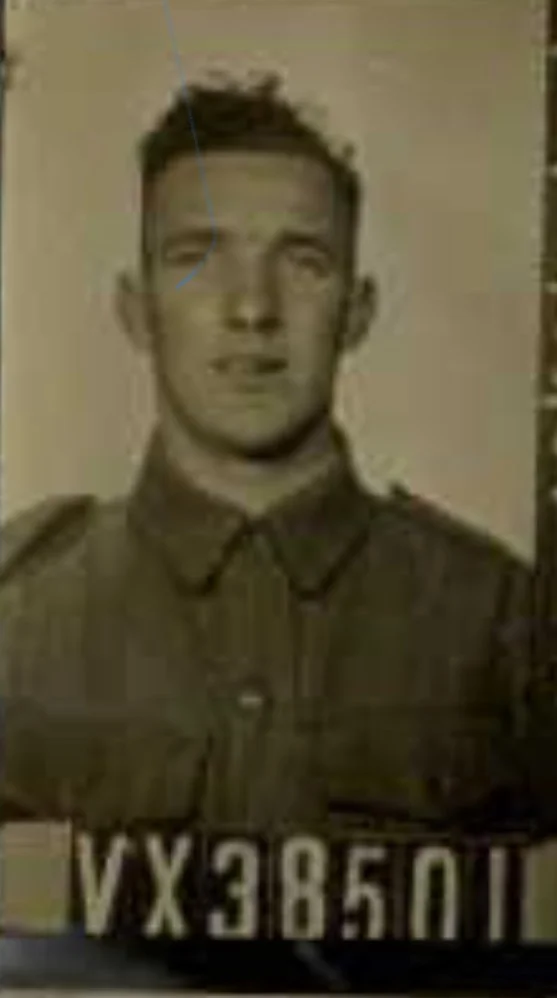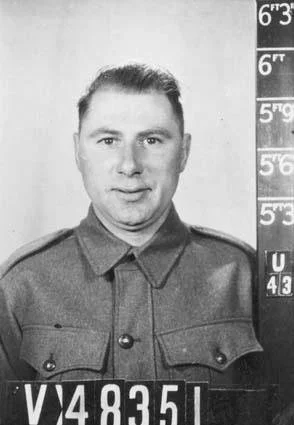WATTS James Leslie VX38501 B Coy [Ch]
David Rees has supplied this fascinating video interview of his Uncle Pte Jim Watts VX 38501 2/29th Battalion B Company.
Jim past away in June 2010
"Jim Watts volunteered for service in WW2 in 1940. After doing his basic training he was appointed to B Company 2/29th battalion. Jim loved Army life, plenty of tucker and PT training! He said it was a pity the Japs has to come along and spoil it. Hailing from Inglewood Victoria Jim came from a hard working country family. He excelled at football and was invited by Fitzroy, St Kilda and Richmond to go to the Big Smoke. He completed a pre season at St Kilda shortly before joining up. Jim was wounded in action early in the battle of Muar Road, only just getting back to the Battalion at the time of the surrender. His POW experience was spent mainly on the island of Blakanmati. They were worked relentlessly on the docks by the Japanese guards. It took a great toll on him physically at the time, and mentally for many years to come. Upon release like many he was fattened up and sent home. He never really talked about his experiences until about the time of the making of this film. I guess he thought he was getting on in age, and perhaps he had a story worth telling. I think he was right!"
ROLLASON Herbert (Bluey) VX55281 D Coy [Ch]
I am passing on the sad news of the death of Herbert Rollason VX55281 D Company. Enlisted 30.7.41
Known as Bluey, he and Bill Young 9(2/29th) were the two remaining survivors of Outram Rd Gaol
Bluey had a tough childhood. He was born in Maldon, Victoria and given to a nearby family at age 12months. This couple had no children and he was forced to work hard and was mistreated severely by his adoptive father, though he says he was well fed.
He took the name of his adoptive family and it was only later in life he found he had never been formally adopted nor had a birth certificate.
The couple had no other children and he became a bit of a loner. The family moved around quite a lot, as was often the case during the depression. At age thirteen he found himself in Bendigo and began working around the area on orchards and dairy farms.
Work was tough and so enlisting seemed a better option and at age eighteen, he joined the 2/29th battalion and was soon on the way to Malaya.
Bluey, not happy with all the chaos of Selarang Barracks decided he’d go through the wire. He met up with a couple of men and though they had a some narrow escapes, they eventually made a camp in the mangrove swamps. There they managed to survive, scrounging at night and relying on help from the Chinese and Malays
After six months their luck ran out when a local reported them to the Japanese. Taken to Kempetai headquarters Bluey was sentenced to eight years in the notorious Outram Rd Gaol.
Bluey said “the only good thing his adoptive father had done was toughen him up, enabling him to survive through those terrible years”.
I well remember Bluey as a child, he was a small wiry man with red hair, as his name suggests. He was a visitor to our home on occasions. Never one for formality, he wasn’t interested in the POW meetings or formalities, but he was a tireless worker. The Bendigo POW’ would collect and cut 10 ton of wood every year and then deliver it to all the POW widows in the area, Bluey was always to the fore when it came to these and other days when hard work was required.
He along with his wife Freda and their 5 children would attend the yearly Christmas picnics, cricket matches and other social functions that the men held over the years.
Diane one of his daughters has predeceased him.
Bluey was aged 93.
Marg Hogan, Vice President
SMITH Francis Coulton VX48351 D Coy [Ch]
Francis served with the 2/29th Battalion, D Company
Service Number - VX48351
Date of birth - 31 Oct 1908
Place of birth - MANSFIELD VIC
Place of enlistment - CAULFIELD VIC
Next of Kin - SMITH M
Francis Coulton Smith died in Brisbane on 24 May 1981. His death notice in The Age on 25 May 1981 might give clues to relatives (the fact that it was published in The Age is a clue to potential relatives or friends in Victoria). It's a fairly large net to be looking for 'Smith' unfortunately.
He was born 31 October 1908 at Mansfield, the son of William Coulton Smith (a teacher who lived at 38 Wheatland Road, Malvern, died September 1945) and Rosalie Myrtle Mummery (who survived her husband, died 18 March 1972 in Wangaratta). I cannot find a record of their marriage in Victoria or NSW.
According to Victorian records, Francis Coulton Smith was the only child born to William and Rosalie Smith born in Victoria from 1880 to 1919.
Francis Coulton Smith married Alice Langlands in 1952 in Victoria. (Alice had a sister Molly, their mother died on 1 January 1950).
He appears to have moved to Queensland.
We don't know if they had children
WILSON, William Gordon VX63826 C Coy [Ch]
Report on Gordon Wilson Diary:
By Dianne Cowling
Gordon served in the WW1 but when urgent calls went out for volunteers to serve in WW11 in the Far East against the Japanese invasion, Gordon again joined up.
Gordon trained with the AIF at Darley Camp in NSW and was finally shipped out on the Aquitania, from Sydney on 10th January 1942 for Malay. Unbeknown to one and all, this was just over one month before the allies were to surrender to the enemy on the 15th February 1942.
Their ship travelled down from Sydney around the Victoria coast, across the Great Australia Bight and on to Perth WA. The trip through waters during this time of the war was harrowing and exciting and Gordon describes the allied ships that shepherded them safely through dangerous waters to stop for a short stay in Sunda Bay where the Captain was told to return to Australia. The fateful decision to not return would see these late arrivals taken POW shortly after their arrival in Singapore.
The Aquitania continued in convoy throughout January 1942, to finally arrive at the destination, Singapore, 24th January 1942. The men were to be immediately sent to Malay, Johore where they were to have joined the 2/29th as reinforcements but were still on Singapore Island until the end of January. Gordon describes the conditions at the time and it is ‘an eye opener into the frustration and helplessness the men were feeling at the time.
Gordon describes in great detail of the conditions and what they had to face each day until finally the fateful day of surrender arrives and they are all POW’s of the Emperor of Japan for 1276 days and so begins a time of depravation and bravery in the face of man’s inhumanity to man. Gordon’s diary is a vivid day by day account of what he and his mates went through, first on Singapore Island and then as part of F Force on the Thai Burma Railway. How they came across their other mates in H Force and the conditions, weather, food and treatment of these brave men, those who survived and their mates who didn’t. Kindness in the face of unimaginable horror, sacrifice for one’s mates in the hope that this will make a difference if only they can survive another day. Even during this time, Anzac day, the anniversary of the Battle of Muar (17th January) Melbourne Cup day, Christmas Easter, individual birthdays and even family members back home are still celebrated and not forgotten. As 1945 dawns they wonder if this is the year and start again to look forward to when their torment will finally end. Gordon counts the time off in weeks and as the weeks 156 – 159 show a marked air movement by allied planes hope builds. Their hope of Liberation is never far from their thoughts as they continue to encourage and help other survive and look for every positive sign from day to day that soon this will all be over. 11th June 1945 Gordon is allowed to send a wireless message home and his thoughts are for his family and easing their worry as he sends not complaints but instead says ‘ I am quite well don’t worry, love to children dad and & mum, no mail since Feb 44, remember me to relatives, longing for early reunion, Gordon.” And he thinks “Do hope they get it ok”.
Despite poor reports by British Officers of the performance of the 8th Division these men know it was “a lie! A B-----a----lie”“The Eighth Div fought fantastically and bravely. Thirty days and thirty nights, never more than 15 minutes rest. Almost never a British or allied plane; Only Jap planes, as if the heavens’ belonged to them. ”Gordon wrote his diary at the time so it is a day to day account with all the stark details only a first-hand account can deliver. Heartbreaking and yet it makes one proud to see how these brave Australian soldiers never lost their humanity or hope. Not for the faint hearted
Wells Blog
Duis mollis, est non commodo luctus, nisi erat porttitor ligula, eget lacinia odio sem nec elit. Maecenas faucibus mollis interdum. Nulla vitae elit libero, a pharetra augue.



![WILSON, William Gordon VX63826 C Coy [Ch]](https://images.squarespace-cdn.com/content/v1/51f4c75ce4b08b0bde0b9cad/1749961466507-BL3SYTKQN34324QUE6ZD/gordon+wilsno.jpg)